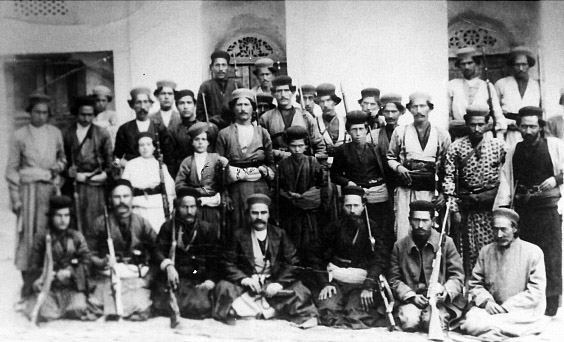In World War I, Iran was neutral. Western interest in Persia was based on its significant oil reserve and its strategic situation between Afghanistan and the warring Ottoman, Russian, and British Empires. Persia was divided into northernand southern spheres of influence under the Anglo-Russian Treaty of 1907. The treaty defined their respective spheres of influence in Iran and Afghanistan and provided a counterweight to German influence.

This treaty was widely viewed by Iranians as having made the nation into nothing more than a British and Russian protectorate, so during the World War I, many localprotesters occurred in Iran against the British and Russian forces participating in war against Central powers of World War I. In Northern Iran, Jangal movement of Gilan, was the main operating local force against the British and Russians forces, and in Southern Iran, Qashqai, Tangistani and Laristani tribes were the main resisting power against the British empire. In both Southern and Northern movements, Persian Central Government Gendarmerie supported the rebels.
.jpg)
Germany established their Intelligence Bureau for the East on the eve of World War I, dedicated to promoting and sustaining subversive and nationalist agitations in British India and the Persian and Egyptian satellite states. The bureau was involved in intelligence and subversive missions to Persia and Afghanistan to dismantle the Anglo-Russian Entente. The bureau's operations in Persia were led by Wilhelm Wassmuss. The Germans hoped to free Persia from British and Russian influence and to further create a wedge between Russia and the British, eventually leading to an invasion of British India by locally organized armies.
.png)
Rais Ali Delvari was an independence fighter and anti-British colonialism activist now remembered as the national hero of Iran, who organized popular resistance against the British troops, which had invaded Iran in 1915.
During first years of WWI, Rais Ali Delvari and Wassmuss were busy formulating a general Anti-British uprising in Persia. In 12 July 1915, Rais Ali and Tangestani's attacked the British residency in Bushehr but they were relapsed.
.jpg)
On 8 August 1915 the British forces occupied Bushehr with five hundred more Anglo-Indian cavalrymen and on 14 September removed Mokhber-al-Saltana from Shiraz and installed Habib-Allah Qaw?m-al-Molk as acting governor of Fars Province. Between August and October 1915, Qaw?m-al-Molk received financial support from the British. But in late December the British prot�g� was expelled from Shiraz by pro-German officers of gendarmerie and the radical Democrat Party members who occupied the city and confiscated the British assets.
Five days later British ships bombarded the headquarters of the Tangestanis tribal at Dilvar; and on 3 and 9 September the Anglo-Indians repulsed during bloody clashes several Tangistani raids, in this clashes, Rais Ali was killed. Then the British used pro-British tribes to scatter the enemy into the hinterland. At the end, local tribal leaders murdered the British vice consul (a Persian) in Shiraz.

Rais Ali Delvari, the anti-British colonialism hero and son of Rais Mohammad, was born in 1882 in the suburb of Bushehr. In the age of constitutionalism he was 24, chivalrous, brave, unparalleled in sincerity and famous for patriotism and reliance upon God. Subsequent to British occupation of Bushehr, Rais Ali courageously resisted the aggressors and imposed heavy defeats on them. After occupation of Bushehr, British forces decided to take over Delvar, a place they had earlier experienced heavy defeats. Rais Ali and his companions fought�the occupiers and routed them who were nearly 5000 people.
.jpg)
The uprising of people of Tangestan prolonged nearly for 7 years in which Daliran Tangestan (the brave of Tangestan) pursued two goals: guarding Bushehr, Dashtestan and Tangestan as their habitat and preventing the foreign forces from infiltrating the country and securing the independence of the country. The noble Rais Ali Delvari eventually was attacked from behind by a traitor and martyred on September 2, 1915, when he was 33.
.jpg)
His house, located in Delvar, near Bushehr, has been transformed into ethnological museum. Some of Rais Ali Delvari's personal items, as well as historic documents of his time, various types of guns and horse caparisoning are exhibited in this museum.
In 26 June 1916 an anti-British uprising broke out in Shiraz, but was put down the next day. The fragile British control over F?rs was disrupted in May 1918 when ?awlat-al-Dawla, leading the Qashqais and other pro-German tribal forces from Kazerun, Dashti, Dashtestan and Tangestan, embarked upon a war against the British.
.jpg)
Eventually, ?awlat-al-Dawla�s uprising subsided due to the spread of influenza and British pressure. In late 1920Mohammad Mossadegh, the new governor-general of F?rs, reinstated ?awlat-al-Dawla to the office of ?l??n?. The South Persia Rifles ended its activities following the British supported coup d��tat of 1921, which was followed by the formation of a modern army in Persia and the eventual suppression of tribal rebels.
By Iran Review











